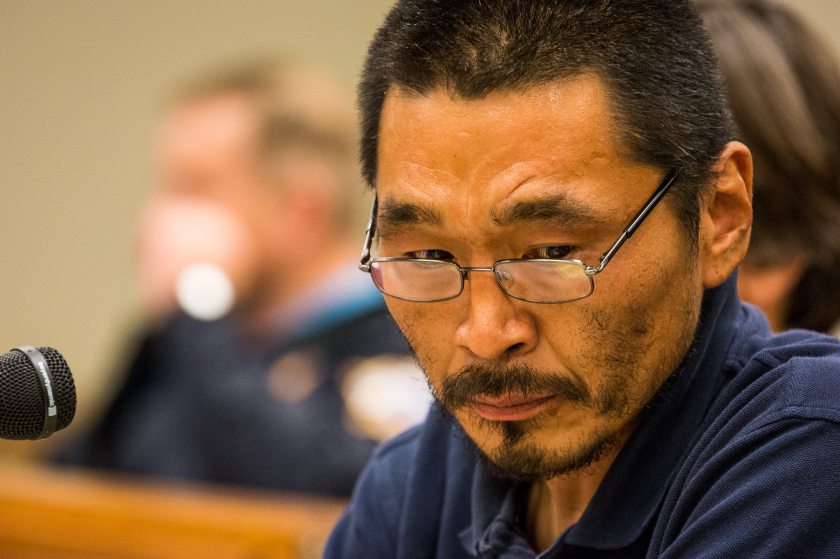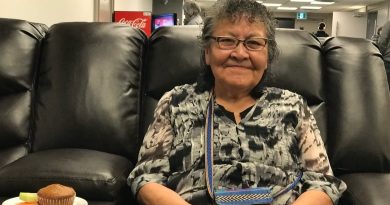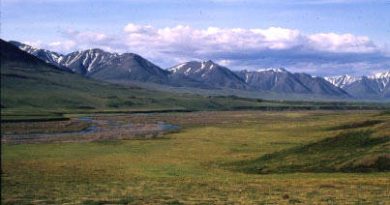Cultures collide in Alaska court

BETHEL — The strangely cathartic business of assembly-line justice ground its way through a state court here Tuesday as one by one the defendants from last summer’s fishery revolt on the Kuskokwim River appeared before a judge to say their piece and await their sentencing.
Most of the fishermen were contrite, some tearful, one or two a little angry about being charged with violating a ban on fishing for Chinook salmon intended to prevent damage to the species. All appeared happy to unburden themselves of emotions still pent up from what happened following that Chinook, or king salmon, closure back in June.
Having said what they thought they needed to say about their acts of civil disobedience, most ended their 30 to 40 minutes before the court by thanking almost everyone, sometimes including the Alaska State Troopers who cited them. They were uniformly fined $500 and put on a year’s probation with significant amounts of the fine then suspended based on their ability to pay.
That every man — they were all men and all Alaska Natives — would be convicted before acting District Court Judge Bruce G. Ward was a foregone conclusion. He settled that Monday morning when he ruled that no one had a religious right to ignore fishing regulations.
Right to survive for salmon
The judge killed an effort by the James Davis of the Northern Justice Project to turn the trials into a referendum on Yupik Eskimo worship of Earth by authoring a seven-page opinion recognizing that many of the defendants had religious beliefs that may entitle them to religious protections for their harvests of wild resources, but adding that at the end of the day the only real “right” belongs to the fish. The legendary run of fish, Ward ruled, had a right to survive.
And when their survival is threatened, everyone’s fishing privileges must suffer to ensure enough fish survive to spawn and return another generation. More than once and in more than one way over the course of a couple days, Ward reminded the more than two dozen defendants on trial that the issue wasn’t really about them — it was about the fish.
He even counseled some of them not to take the court’s decision too hard.
“The court sentences you guilty,” Ward told 53-year-old Micheal Frye from the 350-person village of Napakiak upriver on the Kusko, “but that doesn’t mean you’re a bad guy.”
The unemployed Frye broke down on the stand Monday as Davis tried to lead him to a connection with the spirit of the universe that older Yupiks believe watches over everything.
For many, that older spirit — “Ellum Yua” as some texts describe it — is now all twisted up in Christianity and the belief that the Christian God gave man orders to “replenish the earth and subdue it: and have dominion over the fish of the sea, and over the fowl of the air, and every living that that moveth on the earth. (Genesis 1:28).’
There was a lot of talk about Ellum Yua here, though the attorneys and even some of the defendants had trouble pronouncing it. Proper pronunciation takes some efforts as is described here.
Davis, backed by the American Civil Liberties Union, is planning to appeal Ward’s ruling on the religious fishing rights of Alaska Yupiks. To do that, he needs a group of defendants who’ve established there is a Yupik religion. He spent a lot of time here steering his clients in that direction.
Changes in rural Alaska
Like almost everyone else in rural Alaska, Frye grew up eating salmon, ptarmigan, snowshoe hares, all variety of birds and waterfowl, a moose if his family was lucky, blackfish, whitefish and pretty much any other living thing that could be found and killed.
Frye testified his first memories were of how “I used to go out with my dad with canoe. I remember that. Mostly on trap (lines).”
The canoe is largely gone from this country now. Years ago, it was replaced by the outboard-powered skiff. There are a lot of aluminum Lund boats pulled up on the banks of the still-frozen Kusko these days. Many have fuel-efficient Honda four-stroke motors powering a culture that has become as dependent on oil as any other in the modern world.
Frye said he could remember days his parents told him about a “higher power.” This higher power had different rules than those now set by the scientists with the Alaska Department of Fish and Game and the U.S. Fish and Wildlife Service. The higher power warned people, Frye said, “that we have to get them (salmon) before they’re gone, and if we don’t, our creator won’t give us any more.”
These were the kinds of words Davis wanted to hear, and he or co-counsel Melanie Lockwood from the Bethel-based Association of Village Council Presidents succeeded in eliciting similar statements from witness after witness.
Normally, 100 kings
After 64-year-old John Owens, testifying by telephone from Tuluksak, where he was caring for his injured wife, complained that he only got 50 king salmon this summer when normally catches 100 before the season closes, Lockwood asked him if he believed the fish were given to him by a higher power.
“Yes,” he said.
Is the fishing spiritual, continued the young, well-dressed African-American attorney educated at the University of Alabama School of Law.
“Yes,” Owens said.
“Can you explain it to the court,” she asked.
There was a long, long pause — long enough to make some think the phone connection had been lost — before Owens finally answered, “What do you want me to say?”
Judge Ward repeated the question with some explanation. Owens finally answered that the fishing was important to his spirit and “for our survival, to feed our families….If we don’t go, we have nothing to eat.”
The state would later challenge Owens’ claim to a religious need to catch more than 50 fish. Lockwood would defend it.
“The number of fish Mr. Lockwood caught last year is neither here nor there,” she said. “It’s about his right to fish. The number of fish has nothing to do with it.”
That might have been her view, but for many, the number of fish seemed to have a lot to do with it. The view of many of the defendants was that they simply didn’t get enough fish to meet their needs.
“We strive for 100 (kings),” said 48-year-old David Phillips, also from Tuluksak, population 373. “But last year we didn’t make our mark….spiritually, it brought me down. It didn’t fulfill me to the point I could be satisfied.”
“It is our way of life, our way of eating,” said 33-year-old James Albrite from Akiak, population 309. “Can I go buy a salmon? Can I go buy a steak? It is not easy for us.”
The son of a Moravian pastor, Albrite grew up moving village to village along the Kuskokwim. He saw how people needed fish. One of the younger men on trial, Albrite took the stand in a tank top with a Marine haircut and angry eyes. He ended up in tears.
When Davis asked him how many salmon, he’d caught; Albrite answered that there simply weren’t enough. He felt his he’d let his family down. He teared up.
“It wasn’t good enough,” he said, “not enough for the whole winter….I don’t count. I’m happy with what comes up.”
But to not be allowed to fish at all….
“It’s my God-given right,” Albrite said.
Undercurrent of rebellion
On and off the witness stand, there were many statements like that. It would have been easy to conclude the fishermen believe there is an endless supply of salmon, but none of them really believe that.
Talk to them one on one, and they recognize someone must control harvests. A big part of the issue is who. To understand that you have visit this regional hub in western Alaska.
Aside from the Alaska Commercial Co.’s sprawling general story — a smaller version of a Walmart Supercenter with bigger prices — the biggest and best buildings in town belong to the government in one form or another. This is a company town, and the company is the government that’s here to help people.
Sadly, the helpful government has a way of telling people what to do, and people who don’t own much but their pride don’t always take well to that. There is an always-simmering undercurrent of rebellion here.
When the residents of Kwethluk, population 721, went fishing last June in violation of the king-salmon closure, their 62-year-old Village Public Safety Officer joined them.
“I don’t think trying to feed my family is breaking the law,” Max Olick testified. “My family goes after kings….they’re out there trying to survive. Kings are very special to us. They’re given to us by God.”
Olick ended up cited by a friend — Alaska Wildlife Trooper Mike Cresswell, who has spent almost a decade patroling the Kusko. He cited more than a few people he knows last year, more than a few of them friends. It wasn’t much fun, he admitted.
Balding, middle-aged and blessed with one of those faces that always appears friendly, Cresswell also tried to talk a number of people out of breaking the law. It didn’t always work. He got to Akiak too late. A fishing closure had already been ordered and the rebellion was brewing.
“We hadn’t been consulted,” said Samuel Jackson, the second chief from Akiak, although in early June state and federal officials had met with villagers.
“There were not many fish then,” he said. Both sides agreed not to fish for a week.
“We were told at the end of that week we would be able to go fishing,” Jackson said, but then came the order all fishing was shut down. The tribe met to talk about it. Members decided to go fishing anyway. They even called troopers to tell them.
‘Our God-given right’
“We’re raised to avoid conflict,” Jackson said. “We’re not hiding from anybody. We went to practice our God-given right.”
Cresswell went to Akiak to try to calm everyone down. It didn’t work. They went fishing. He started writing citations. Jackson told the judge Tuesday he still wasn’t convinced any laws were broken.
“It depends on whose laws or whose supposed laws we were breaking,” he said. “All of our traditional indicators were there. It’s only common-sense there were fish in the river.”
People were catching kings far upstream from Akiak, he said, and the mosquitoes were out. Those were the signs. What the scientists were saying was just talk.
That someone who “just got out of college” would know more about the salmon in the Kusko than someone who has spent 40 years on the river, “it is just hard for me to believe,” he said. “I think we’ve seen lower numbers (of fish) in the past. We believe the numbers were off last year; there were fish.
“With all due respect,” he told the judge, “these elders behind me are the real biologists out there….I’m sorry you have to believe Mr. Elison’s word.”
Mr. Elison is Travis Elison, the Kuskokwim River fisheries manager for Alaska Fish and Game. In April he testified that it was clear early in 2012 the Kusko king run was again in trouble after a string of bad years.
At the time, fisheries biologists were shooting for a minimum goal of 127,500 fish on the spawning beds after a disastrous spawning season in 2010 when only 49,000 kings got past the nets of fishermen and 2011 when only 72,000 made it.
The historic average number of spawners is 150,000. Worried about a replay of 2010, biologists were conservative and managed to restrict fishing enough to put about 77,000 kings on the spawning grounds after fishing season ended last year.
They would liked to have seen more, but the state Board of Fisheries in January of this year decided it might be possible for everyone to make do with less. Under pressure from Kusko fishermen, the board set a new, smaller and more flexible Kuskokwim spawner target of 65,000 to 120,000 kings for the biologists.
In general, the scientists say the more kings that make it past nets and spawn, the more that are likely to come back in future years. But it isn’t quite as simple as that and king salmon numbers in streams across Alaska appear to be in decline. The reasons why are not clear.
Everyone is hoping last year’s crisis was a one-time event. State biologists are this year hoping to see about 200,000 kings return, which would allow for plentiful fishing in the subsistence gillnet fishery and still allow 100,000 or more spawners to survive.
There are, however, no guarantees. The biologists were expecting about the same number last year and only about 135,000 came back. The subsistence fishery caught approximately 58,000. The state does not officially forecast Kuskokwim king runs, but it does offer an “outlook.”
The outlook this year calls for a return of anywhere from zero to 300,000 fish. () In an ideal world, it will be the latter.
If not, who knows what happens this time. The defendants at trial here this week seemed happy just to find someone willing to listen to their concerns and their problems, but that doesn’t mean they will be any more cooperative if a crisis develops this summer.
Everyone recognizes there is a problem; no one recognizes they are a part of the problem. As Jackson observed, “I do not think we upriver from Bethel (in Aniak) make a very large impact on the fish.”
That is the view of almost every village. Individually, they are right. Collectively, the biologists say, they are badly wrong. But few residents want to believe that. Few remember the really bad times when the salmon failed to return. And they prefer to believe in what they view as a different type of “conservation.”
“When I give you a gift, if you do not accept that gift, my heart would be broken,” Jackson said. It is that way with the spirits of nature, too.
“If we do not accept that fish,” he said, “the great spirit is not happy with us.”
Contact Craig Medred at craig(at)alaskadispatch.com



